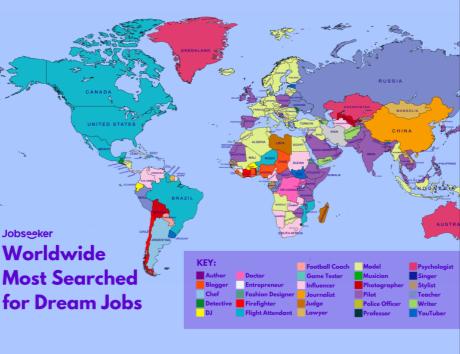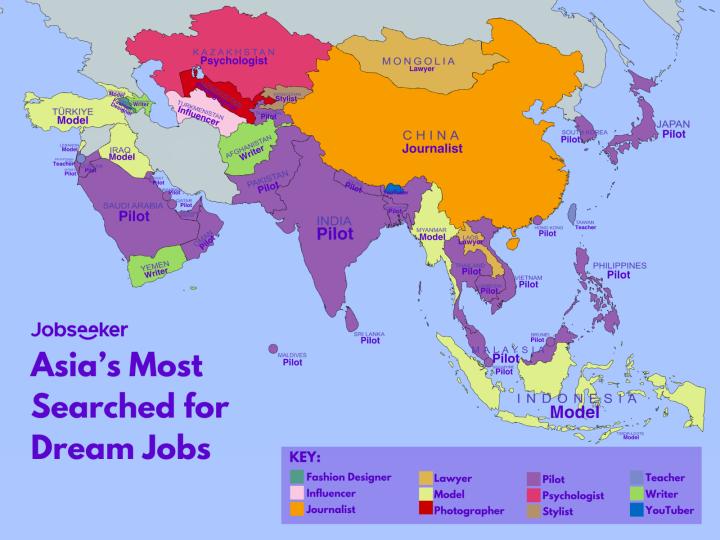Dream Jobs Around The World (And How to Find Yours)
What’s your dream job? You might already be doing it, or maybe it remains a long-harboured aspiration. There may be a career you’ve been dreaming of since your school days, or you might have stumbled upon your dream role by chance.

Either way, most of us have a ‘dream’ job, a tailor-made role to motivate us, ignite our passions, and enable us to get paid doing something we genuinely love.
However, for many people those dreams remain unfulfilled – apparently, just 1 in 4 UK adults are currently doing the job they dreamt of when they were at school.
For many of us, securing a dream job may seem like a pipe dream; but through a combination of persistence and hard work, it might not be quite as impossible to forge your dream career path as you might think.
But which are the most ‘dreamed about’ jobs? Which roles do most of us imagine ourselves doing? And do the types of jobs we aspire to differ between countries and continents? Well, we’ve scoured global search data to find out.
By analysing international search volume for top job-related searches, we’ve uncovered the 10 most popular dream jobs across the world. We’ve also split our findings by location to reveal the most desired jobs in each country and continent.
Does your dream job make the list? Let’s find out.
Dream jobs around the world
Our study of the most popular dream jobs has taken us across the globe, uncovering the most searched for career aspirations of job seekers and itchy-footed employees in every continent and corner of the world. Some dream of spending their working days several thousand feet in the air, while others would feel more at home on the catwalk.

Africa
Pilot is the dream career among most countries in Africa, coming top in 14 nations such as Kenya, Tanzania, and Zimbabwe. In the continent’s most populated country, Nigeria, the number one career choice is blogger, while in South Africa most people dream of living the life of an influencer.

Asia
In Asia, piloting is also the most popular career choice, ranking at number one in no less than 25 countries — including India, Japan, South Korea, Saudi Arabia, and the United Arab Emirates. Model, lawyer, and writer also feature several times across the continent, with China’s go-to dream career being journalism.

Europe
In Europe, modelling is the most widely-searched profession, representing the preferred career choice in 25 countries including France, Germany, Italy, and Sweden. Pilot tops the list in 9 nations, which includes the UK and Ireland, while the residents of Moldova may have been influenced by watching one too many detective dramas.

North America
Those in North America might be keen to clock up the air miles, but they’d prefer to do so striding up and down the aisles than manning the cockpit — in countries such as the United States, Canada, and Mexico, a flight attendant is the number one dream career. Model, influencer, and pilot are also popular in multiple countries.
South America
The results were varied across South America, with no overwhelming favorites. In Brazil, their dream role is flight attendant, while in neighboring Argentina they dream of cooking up a storm in the kitchen as a professional chef. Influencer, teacher — and even football coach — also feature.

Oceania
In Oceania’s largest nation, Australia, the most popular career choice is a psychologist — the Aussies may have a laid-back reputation, but here they’re drawn towards an emotionally exacting role. The preferred job of New Zealanders is pilot, while flight attendant ranked in first place across four different countries.

The world’s top 10 dream jobs in 2025:
1. Pilot
With around 50,000 monthly searches, it’s plane to see that many people dream of a career in the skies. Skilled in managing complex flight systems and interpreting weather conditions, a pilot may operate an aircraft such as an aeroplane or helicopter — typically for commercial purposes, but sometimes in private or military settings.
A career as a pilot comes with the opportunity to travel, yet it also requires extensive and rigorous training and adherence to strict safety regulations. Pilots often face irregular working hours and the need to adapt to new technologies and regulations, but the earning potential is significant: the average UK salary for a pilot is £42,000 ($105,964 in the U.S.).
Tips for becoming a pilot:
- Obtain the necessary education and training, starting with a Private Pilot License (PPL) and progressing to a Commercial Pilot License (CPL).
- Build flying hours, as most commercial airlines require a significant amount of flight experience.
- Maintain high physical and mental health standards, as regular medical examinations are mandatory for pilots to ensure they are fit to fly.
2. Flight attendant
If you enjoy the mile-high life but would prefer not to have the responsibility of actually flying a commercial aircraft, you might consider a career as a flight attendant. Coming second in our ‘dream jobs’ list, flight attendants typically enjoy a dynamic work environment that differs from the typical office setting.
The opportunity to travel to exotic destinations is an obvious attraction, but this also means dealing with irregular shifts and time zone changes. Suiting someone with excellent communication skills and the ability to remain calm under pressure, flight attendants earn on average £26,500 in the UK, but can make as much as $85,102 in the U.S..
Tips for becoming a flight attendant:
- Develop strong customer service skills and experience (airlines often look for candidates with a background in customer service, hospitality, or tourism).
- Complete a certified flight attendant training program, which covers emergency procedures, first aid, conflict resolution, and other relevant skills.
- Consider learning additional languages, which can be an advantage in this globally diverse profession.
3. Model
Dreaming of navigating a different type of runway? Modeling is a popular profession which typically involves promoting various products, brands, or designers by showcasing clothing or accessories in photoshoots, shows and advertisements. Models can specialize in areas such as fashion, hair, fitness, and commercial modeling.
Modeling certainly has a glamorous reputation — there’s potential for fame and financial rewards, as well as an opportunity to travel — but it’s also highly competitive and often comes with strict physical and aesthetic standards. In the UK, a model earns an average salary of £44,501, while in the U.S. they can earn $54,826.
Tips for becoming a model:
- Develop a strong portfolio showcasing your versatility (include a range of professional photographs highlighting your strengths and different styles).
- Research and approach reputable modeling agencies, ensuring you clearly understand their terms and conditions before signing any contracts.
- Be persistent and resilient, as the modeling industry is highly competitive and often involves facing rejection.
4. Psychologist
How about a career which delves deep into the human psyche? Psychologists specialize in diagnosing and treating mental, emotional, and behavioral problems. Clinical psychologists work with patients to manage specific mental health issues, while educational psychologists work in schools to support students’ learning and emotional needs.
Helping individuals to improve their mental wellbeing — contributing to scientific understanding of human behaviour in the process — can be very fulfilling, but there can also be an emotional toll. Requiring strong communication skills, empathy, and patience, on average, a psychologist can earn upwards of £40,000 in the UK ($105,500 in the U.S.).
Tips for becoming a psychologist:
- Obtain a relevant undergraduate degree, typically in psychology or a related field.
- Pursue postgraduate education, such as a Master's degree and a Doctorate in Psychology (Ph.D. or Psy.D.).
- Gain practical experience through internships or supervised placements (this is crucial for developing clinical skills and is often a requirement for licensure).
5. Influencer
Perhaps unsurprisingly given the increasing dominance of social media in our lives, the idea of becoming an influencer is innately attractive to many people. An influencer is generally seen as an expert in their particular field, boasting a large social media following and the ability to affect the behavior, opinions, and purchasing habits of others.
Whether or not you consider it a ‘real’ job, a career as an influencer offers creative freedom, a varied lifestyle, and the potential to generate a healthy income — the average salary is £33,265 ($55,273) — but don’t be fooled: to turn influencing into a full-time career, a serious amount of hard work and persistence is required.
Tips for becoming an influencer:
- Identify your niche (influencers are often involved in areas such as fashion, health, beauty, tech, or career coaching).
- Develop a content strategy that focuses on high-quality, relevant social media content aimed at a specific target audience.
- Actively engage with your audience, and look for opportunities to grow your network by establishing relationships with fellow influencers.
6. Doctor
Despite the pressures the healthcare sector has been under in recent years, a doctor is still seen as a prestigious and attractive career choice. Of course, ‘doctor’ itself is quite a general term, and there are opportunities to specialise in several areas — for example, there are general practitioners (GPs), physicians, surgeons, and psychiatrists to name just a few.
The type of specialism you choose will ultimately determine the amount of training required and your overall earning potential, but a fully qualified doctor takes home an average salary of £72,000 (or $229,300 in the U.S.). Any medical profession requires a huge amount of commitment, however — with a minimum of five years of study typically required.
Tips for becoming a doctor:
- Get the relevant training and qualifications (a doctor will typically spend around five years at medical school before doing two years of foundation training).
- Identify the area of medicine you want to specialize in (you’ll normally need to decide this in the third or fourth year of your training).
- Gain experience by volunteering in education, charity or social care settings.
7. Teacher
Teachers are in high demand, with many institutions struggling to recruit qualified candidates. That said, teaching is clearly still an appealing career choice across the globe, with many people likely attracted to the profession by the opportunity to make a genuine difference to students and local communities (not to mention the long holidays).
Again, teaching is a versatile career. Some teachers specialize in certain subjects, for example, while there’s an opportunity to work with different age groups depending on the type of institution you work in (such as primary or secondary school). As a teacher, you can hope to earn an average salary of around £34,000 in the UK (or $66,000 in the U.S.).
Tips for becoming a teacher:
- Obtain the necessary education and qualifications (usually a bachelor’s degree in education or a specific subject area, followed by a teaching certification).
- Choose your preferred teaching level (secondary, special education, etc.) and subject specialism, such as maths, science, or humanities.
- Gain practical experience through student teaching, internships, or volunteering in educational settings.
8. Lawyer
Long seen as an esteemed career, the term ‘lawyer’ can apply to a number of legal professions — a solicitor or a barrister may be considered a lawyer in the UK — and essentially describes anyone qualified to give legal advice in one or more areas of law. Most lawyers specialise in certain areas, such as corporate law, employment law, or criminal law.
Like medicine, a career in law requires a dedication to studying — it typically takes at least six years to qualify as a lawyer — but the rewards are usually ample, with the average UK salary at around £68,500 (in the U.S., lawyers can earn in the region of $135,000).
Tips for becoming a lawyer:
- Complete a qualifying law degree or a non-law degree followed by a Graduate Diploma in Law (GDL).
- Undertake the Legal Practice Course (LPC) for solicitors or the Bar Professional Training Course (BPTC) for barristers.
- Gain experience through a training contract (for solicitors) or pupillage (for barristers), which involves working under the supervision of experienced lawyers.
9. Firefighter
It may be a somewhat dangerous career choice, but a firefighter does more than simply battle blazes; as well as rescuing people from dangerous situations, they may be required to respond to traffic accidents, medical emergencies, or hazardous material spills (in addition to saving cats trapped in trees, of course).
Firefighters also conduct regular drills and training to maintain peak physical condition and readiness, and they play a crucial role in educating the community about fire safety and prevention. It’s a physically demanding role requiring a strong sense of teamwork and discipline, with an average salary of around £28,700 in the UK (or $53,000 in the U.S.).
Tips for becoming a firefighter:
- Acquire relevant qualifications or experience, such as a Level 2 Certificate in Fire and Rescue Services Operations in the Community.
- Gain experience in a role involving teamwork, discipline, and physical activity.
- Apply to a Fire and Rescue Service; the selection process involves physical and written tests, an interview, and a medical examination.
10. Entrepreneur
Put simply, an entrepreneur is someone who starts or runs their own business. Entrepreneurship involves significant financial risk, but there are many unique advantages; aside from the potential to earn ample revenue, it provides a degree of freedom and autonomy alongside the ability to bring a creative vision or business idea to life.
That said, it often requires a high level of resilience and dedication, as success often comes littered with setbacks. Entrepreneurs must also handle numerous responsibilities, from financial management to strategic planning. A career as an entrepreneur therefore demands a unique blend of creativity, perseverance, and adaptability.
Tips for becoming an entrepreneur:
- Identify a market need and develop a unique business idea or innovation, focusing on areas you’re passionate about or have expertise in.
- Create a comprehensive business plan that outlines your vision, strategy, market analysis, financial projections, and operational structure.
- Network extensively and seek mentorship (building relationships with other entrepreneurs, industry professionals, and potential investors).
What is a dream job?
Of course, the definition of a ‘dream’ job will vary from person to person, depending on myriad factors such as an individual’s passions, interests, values, motivations, skills, and personality traits. Ultimately, a dream job brings satisfaction and fulfillment, whether you aspire to sit behind a desk or the controls of a Boeing 737.
Your criteria for a dream job may not exclusively concern the type of profession you desire, either. Factors such as flexibility, working culture, development opportunities and job security — as well as salary and benefits — can all play a role in determining whether a role represents your ideal vocation or simply ‘pays the bills’.
Your dream career might be one with minimal stress which affords you a healthy work-life balance, or perhaps you aspire to work in a fast-paced environment that offers plenty of opportunities to collaborate with talented and interesting people. Your dream job is not just about what you do, but what you value in a role.
So, what does a dream job look like? While the criteria is rarely fixed, it might encompass one or more of the following factors:
- Passion and interest. Often, dream jobs are those which enable you to do something you love and feel genuinely passionate about.
- Skills alignment. A dream job could tap into your existing strengths, enabling you to utilize your unique skill set.
- Personal and professional growth. Your dream job may allow you to continually learn, grow, and progress in your career.
- Challenge. If your primary motivation is to be challenged, your dream job may be intellectually demanding and force you out of your comfort zone.
- Freedom and flexibility. You may consider a dream job something that affords a healthy work-life balance, allowing you to pursue non-work interests and passions.
- The ability to make a difference. If you’re someone who desires to make a positive impact, your dream job may provide an opportunity to help others in some way.
- Security and stability. For some people, a dream job may simply be one they see themselves doing for years to come.
- Pay and benefits. Your salary and benefits may be the most important criteria in your dream job, allowing you to live in relative financial comfort.
In essence, a dream job can mean anything to anyone — your dream job may in fact be someone else’s nightmare. You might dream of a career in teaching, for example, while others may loathe the idea of spending their days surrounded by children. And while you may feel perfectly happy in your comfort zone, others might prefer to be challenged on a daily basis. When it comes to a ‘dream’ role, it’s each to their own.
How to find a dream job
The journey to your dream job invariably requires introspection, in-depth research, skill development, and a deep understanding of what truly motivates you. It’s often about more than just chasing a prestigious title, but discovering a role that resonates with your passions, aligns with your life goals, and fulfills your desire for personal and professional growth.
Think about what’s most important to you
As we’ve discovered, a dream job is not solely determined by job title — pilot, influencer, doctor, and so on — but by many factors such as work-life balance, job security, and opportunities for career advancement. Ultimately, your dream job is a reflection of your values, goals, and motivations.
Finding your dream job is first about discovering what’s most important to you in your career. Is your primary motivation to do something you feel passionate about? Do you want to make a positive difference in the world? Is financial stability your top priority? Ask yourself what makes you tick; what motivates you every day.
Perform a self-assessment of your skills
For many people, a dream job allows them to leverage their existing strengths. Someone with strong analytical skills, for example, may favor a career in consultancy, while a creative type might aspire to become a designer or a writer. It’s important to assess your unique skills and the types of roles where these are transferable.
To do this, reflect honestly on your strengths as well as areas for improvement, considering past feedback you’ve received. Align these skills with your passions and interests, identifying which of them could be applied in a job setting. If you already know your dream job, it’s important to understand any skills and qualifications you’ll need and identify gaps.
Build a professional network
Once you’ve identified your dream career, it’s a good idea to start networking with those in your chosen industry. By attending industry events, joining online communities, and engaging with people on social media platforms such as LinkedIn, you can learn more about what it takes to be successful in your desired field while making valuable connections.
Building a professional network is particularly crucial when you have little or no experience. Networking can provide access to hidden job opportunities, while also enabling you to gain insights into the realities of the job and advice on how to break into the field. Furthermore, these connections may become valuable advocates for you in future.
Learn everything you can about the role
If you have little or no experience in your chosen field, it’s important to absorb as much information about it as possible. On the one hand, this will help you determine whether the role is the right fit for you, while on the other, it will equip you with knowledge that may be essential for someone looking to break into that particular field.
The career you’ve chosen might require you to obtain a qualification, but even if that’s not the case, there may be fundamental (or at least desirable) skills and knowledge you can obtain through a training course or simply by performing your own research.
Tailor your CV to the role you’re looking for
We recommend tailoring your CV and your cover letter to the specific role, company, or industry you’re applying to. When you’re looking to secure a dream job, your application should convey how your skills and experience specifically match the type of role you desire, or at least how they are transferable.
Of course, if you’re building a resume with no experience (perhaps because you’re a recent graduate or making a career change), this can be challenging; but it’s crucial here to focus on relevant qualifications and soft skills, and include a compelling cover letter which highlights your enthusiasm and passion for the field or the role itself.
Be prepared to play the long game
It’s important to appreciate that the path to your dream job may not always be straightforward. It may require you to gain a qualification, for example — which might take many years of studying, as is often the case in the medical or legal professions — or to start at the bottom rung of the ladder and work your way upward.
If your dream job requires experience or skills that you don’t yet possess, you may have to be prepared to take on a role that wouldn’t be your number one choice but offers you a pathway to the career you aspire to. For example, many of the world’s top chefs likely started as kitchen assistants, providing them with an initial ‘way in’ to the catering industry.
Conclusion
Do dream jobs really exist? Whether you’re dreaming of navigating flight paths, diagnosing illnesses, fighting legal cases, or rescuing cats from trees, almost everyone will have their ‘ideal’ vocation — and while these roles may take persistence, hard work, and sometimes years of study to attain, it’s certainly not impossible to achieve your career dreams.
As our study shows, dream jobs will vary widely between individuals — as well as countries and continents — and will be dependent on a range of factors such as passions, interests, values, skills, financial aspirations, and personality traits. Dream careers are characterized not just by the type of role but also by the flexibility, culture, and reward they offer.
Looking to secure your dream role? See how our CV templates can help you stand out, and don’t forget to check out our resume writing tips.
Methodology
As CV and resume experts, here at Jobseeker, we set out to explore the world’s most popular dream jobs. Our seed list of the most popular jobs was obtained by combining lists from around the careers market, choosing 35 jobs most commonly associated with a dream career.
To find the top 10 most popular dream jobs overall, the seed list was uploaded to the search analysis tool Ahrefs and ranked by total global search volume (GV). We then delved further into the data to find the most popular dream job in each country, across six populated continents (Asia, Africa, Europe, North America, Oceania, and South America).
Each country in the list was assessed against the 35 dream jobs using the search template “how to become a [JOB TITLE]”, with the most searched dream job for each country listed as the final result.
When data for certain regions wasn’t available through Ahrefs, Google Keyword Planner was used as the deciding factor. Some regions have been omitted from the results for lack of data when assessed against both platforms.
We also used careers websites to research and record the average salary for the top 10 dream jobs in the UK and the U.S., these figures are correct at the time of the study.
Data recorded: January 2024
Impress potential employers with your resume
Follow step-by-step professional guidance to create a polished resume in minutes.



